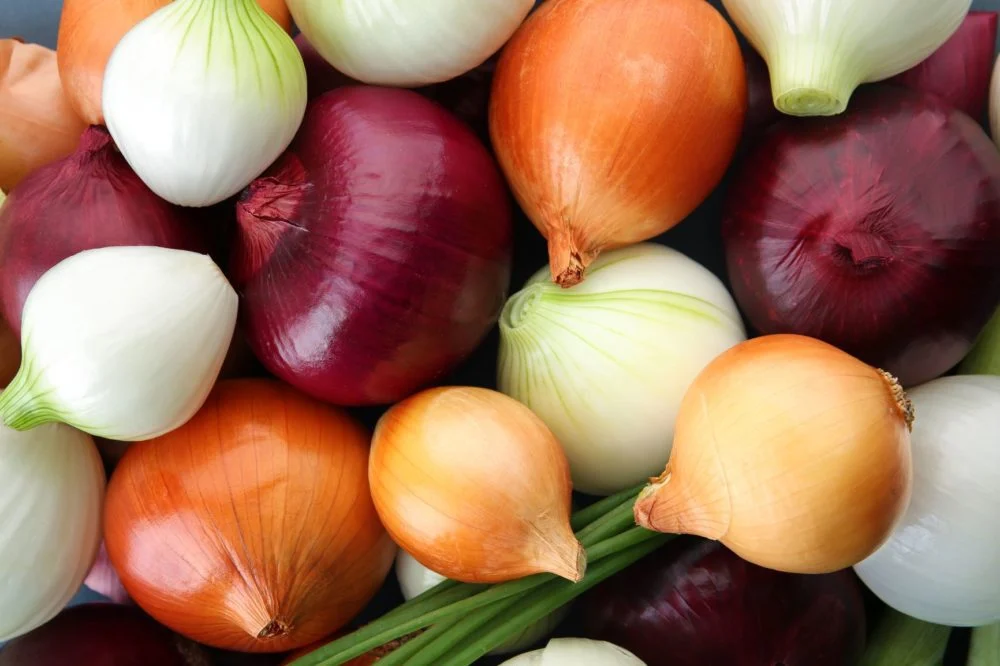Onion:
Scientific Name: Allium cepa is the scientific name for the onion.
Onion Benefits:
Onions are packed with nutrients and offer several potential health benefits. They are a good source of vitamin C, dietary fiber, and various antioxidants. Onions may support immune function, heart health, and have anti-inflammatory properties. They may also have antibacterial and anticancer effects. However, individual benefits can vary, and it’s important to maintain a balanced diet overall.
Onion Nutrition:
Onions are low in calories and provide various essential nutrients. They contain vitamin C, vitamin B6, folate, potassium, and manganese. Onions also contain antioxidants such as quercetin and sulfur compounds that contribute to their health benefits.
Disadvantages of Eating Raw Onion:
While raw onions can offer health benefits, some individuals may experience digestive discomfort, heartburn, or flatulence after consuming them raw. Cooking onions can help reduce these side effects for some people.
Best Time to Eat Onion:
The timing of consuming onions depends on personal preference and the dishes in which they are used. Onions can be consumed at any time during the day as part of a well-balanced diet.
Effects of Eating Onion at Night:
Some people may experience indigestion or acid reflux if they eat onions before bedtime, especially if they are prone to these conditions. It’s recommended to monitor your body’s response and avoid eating large amounts of onions close to bedtime if it causes discomfort.

Onion Benefits for Men:
Onions may offer benefits for men’s health. They contain compounds that may support prostate health and have potential anticancer effects. Additionally, the antioxidants in onions can help protect cells from oxidative damage.
Onion Benefits for Women:
Onions can be beneficial for women as well. They may help balance hormones, reduce the risk of certain cancers (such as breast and ovarian cancer), and contribute to overall health due to their nutrient content.
Onion Benefits for Eyes:
Onions contain certain antioxidants and sulfur compounds that may have a protective effect on the eyes. They may help reduce the risk of age-related macular degeneration (AMD) and cataracts. However, more research is needed to establish a direct cause-and-effect relationship.
Onion Benefits for Skin:
Onions contain antioxidants and certain compounds that may have anti-inflammatory and antibacterial properties, which can be beneficial for the skin. They may help reduce inflammation, promote wound healing, and protect against certain skin conditions. However, individual results may vary.
Onion Benefits for Skin and Hair:
Some people believe that applying onion juice to the scalp can promote hair growth and improve the condition of the hair and scalp. Similarly, onion extracts or onion-infused skincare products may have benefits for the skin. However, scientific evidence supporting these claims is limited.
Onion Rings:
Onion rings are a popular snack or side dish made by coating onion rings in batter and frying them until crispy. They are often served with dipping sauces.
Onion Bulb:
The onion bulb is the underground part of the onion plant that is typically used in cooking. It consists of multiple layers, or scales, that make up the structure of the onion.
Onion Seeds:
Onion seeds, also known as onion sets, are small bulbs used for planting and growing onions. They are typically planted in the ground or in containers to cultivate onion plants.
Onion Vitamins and Minerals:
Onions are a source of various vitamins and minerals, including vitamin C, vitamin B6, folate, potassium, and manganese. They also contain small amounts of other nutrients such as calcium, iron, and magnesium.
Onion Nutrition Facts:
Onions are low in calories and high in nutrients. A medium-sized onion (approximately 110 grams) contains around 44 calories, 10 grams of carbohydrates, 2 grams of fiber, and 1 gram of protein. The exact nutritional composition may vary slightly depending on the specific type of onion.
Onion Protein:
Onions are not a significant source of protein. They contain a small amount of protein, but it is not a primary nutrient provided by onions.
Onion Calories:
The calorie content of onions is relatively low. A medium-sized onion typically contains around 44 calories. The calorie content may vary slightly depending on the size and variety of the onion.
Onion Fat:
Onions are very low in fat. A medium-sized onion contains less than 1 gram of fat.
Please note that individual experiences and reactions to onions can vary, and it’s always best to consume them in moderation as part of a balanced diet. If you have specific health concerns or dietary restrictions, it’s advisable to consult with a healthcare professional or registered dietitian for personalized guidance.

